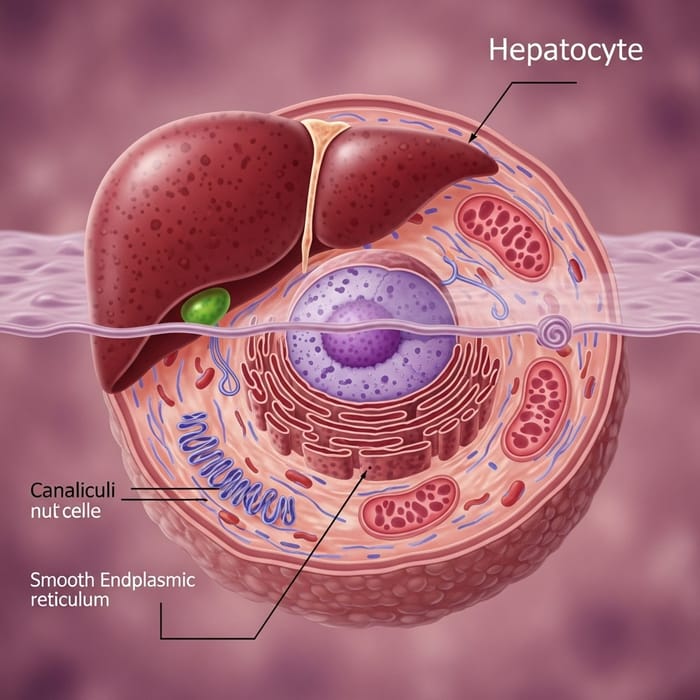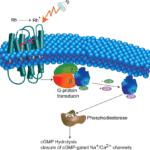What if I told you there’s a single type of cell in your body that acts like a chef, chemist, warehouse manager, security guard, and factory worker—all at the same time? Meet hepatocytes, the incredible liver cells that perform over 500 different jobs to keep you alive.
What Are Hepatocytes?
Hepatocytes are your liver’s main workers—making up 80% of your liver’s total mass. Think of them as the ultimate Swiss Army knife cells: compact, versatile, and capable of handling almost any job your body throws at them.
Here’s the mind-blowing part: A single hepatocyte can switch between completely different tasks within seconds, like a restaurant worker who can cook, wash dishes, take orders, and manage inventory simultaneously.
The Master Chef Analogy
Grandma’s Kitchen on Steroids
Imagine your grandmother’s kitchen during Thanksgiving, but she’s preparing 500 different dishes at once. That’s what each hepatocyte does every day:
The Detox Chef: Takes poisonous ingredients (alcohol, drugs, toxins) and transforms them into harmless leftovers. When you drink wine, hepatocytes literally cook the alcohol until it becomes water and carbon dioxide.
The Storage Manager: Converts excess sugar into glycogen (like turning extra flour into storage containers), then pulls it back out when needed. It’s like having a magical pantry that automatically saves and serves food.
The Protein Factory: Manufactures over 10,000 different proteins—from albumin that keeps your blood thick, to clotting factors that stop bleeding. Without hepatocytes, you’d bleed to death from a paper cut.
The Teenager’s Body Shop
Think of hepatocytes like the ultimate auto repair shop that never closes:
The 24/7 Mechanic
Every 20 seconds, hepatocytes completely refresh themselves—like mechanics who rebuild their entire shop while still fixing cars. Your liver hepatocytes today are completely different from the ones you had three weeks ago.
The Parts Department
Hepatocytes store everything your body might need:
- Vitamins: Years’ worth of B12, months of vitamin A
- Minerals: Iron reserves for making blood
- Fuel: Glucose for instant energy
- Raw materials: Amino acids for building proteins
It’s like having Amazon’s warehouse inside each cell.
The Recycling Center
Old, worn-out red blood cells? Hepatocytes break them down and recycle the iron. Damaged proteins? They dismantle and reuse the parts. Nothing goes to waste.
Real-Life Superhero Stories
The Saturday Night Rescue Mission
When a college student drinks too much at a party:
- Hepatocytes immediately detect the alcohol entering through sinusoid windows
- They drop everything and switch to emergency detox mode
- Special enzymes break down alcohol at exactly one drink per hour—no faster, no matter what
- Byproducts get safely eliminated instead of poisoning the brain
Without hepatocytes working overtime, that student would die from alcohol poisoning.
The Medication Transformation
When Grandma takes her heart medication:
- The pill arrives unchanged at hepatocytes
- They chemically modify it into the active form
- The improved drug goes back into circulation
- It now works 10 times better than the original pill
Many medications are actually inactive until hepatocytes transform them—like needing a key to unlock their power.
The Blood Sugar Balancer
After eating a huge birthday cake:
- Blood sugar skyrockets to dangerous levels
- Hepatocytes sense the emergency and spring into action
- They grab excess glucose and convert it to glycogen storage
- Blood sugar returns to normal within 2 hours
Without this hepatocyte rescue system, eating dessert could put you in a coma.
The Incredible Regeneration Power
The Starfish Phenomenon
Cut away 75% of your liver, and hepatocytes will regrow it completely within weeks. It’s like having a starfish’s regeneration power, but for your most complex organ.
Real example: In living donor liver transplants, both the donor and recipient end up with full-sized, perfectly functional livers within months.
The Self-Repair Mechanism
Hepatocytes monitor themselves constantly for damage. Find a problem? They commit suicide (apoptosis) and get replaced within days. It’s like having construction workers who demolish and rebuild their own workplace.
When Hepatocytes Get Overwhelmed
The Overworked Factory
Chronic alcohol abuse is like forcing workers to handle toxic waste 24/7 without protective equipment. Eventually:
- Hepatocytes start dying faster than they can be replaced
- Scar tissue fills the gaps (cirrhosis)
- The liver factory shuts down
The Fat Storage Problem
Eating too much sugar forces hepatocytes to convert excess into fat. But there’s nowhere to store it, so:
- Fat accumulates inside the cells like cluttered storage rooms
- Normal functions become impossible
- Fatty liver disease develops
It’s like trying to work in an office completely stuffed with boxes.
The Daily Miracles You Never Notice
Morning Coffee Processing
Right now, hepatocytes are breaking down your morning caffeine. Your genes determine which enzymes they use, explaining why your friend can drink espresso at midnight while you get jittery from afternoon tea.
The Invisible Protein Factory
Every 8 seconds, hepatocytes release albumin into your bloodstream. This protein prevents your legs from swelling like balloons by keeping fluid in your blood vessels.
The Cholesterol Controversy
80% of your cholesterol comes from hepatocytes, not food. They make it because every cell in your body needs cholesterol to build membranes. Eating less cholesterol just makes hepatocytes work harder to produce more.
The Numbers That Will Blow Your Mind
- Each hepatocyte performs over 500 different chemical reactions
- They process 1.5 liters of blood every minute
- A single hepatocyte lives about 200-300 days
- They can completely regenerate your liver in 6-8 weeks
- One hepatocyte contains over 2,000 mitochondria (cellular power plants)
Why This Matters to Your Life
Every medication you take, every meal you eat, every toxin you encounter—hepatocytes handle it all. They’re working right now as you read this, performing chemical miracles that keep you conscious, healthy, and alive.
Without hepatocytes:
- You’d die from your morning coffee
- A glass of wine would be lethal
- Your blood wouldn’t clot
- You’d swell up like a balloon
- Any medication would poison you
These remarkable cells prove that sometimes the most important heroes work quietly behind the scenes, performing 500 jobs simultaneously while you go about your day, completely unaware of the microscopic miracles happening inside your liver.



Pingback: The Hepatic Portal System » The Learning Hub